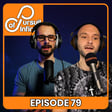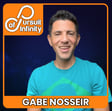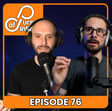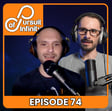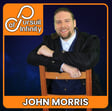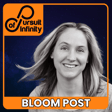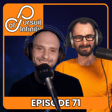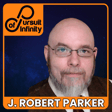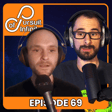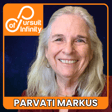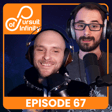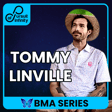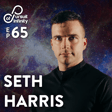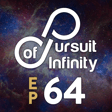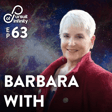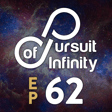Introduction to Catherine McLean
00:00:00
Speaker
Hello and welcome to Pursuit of Infinity. In this week's episode, we welcome Catherine McLean to the show. Catherine is a research scientist, mother, and adventure seeker.
Research on Mindfulness and Psychedelics
00:00:10
Speaker
Her research centers around the effects of mindfulness meditation and psychedelics. Catherine was a lead researcher and session guide at Johns Hopkins University School of Medicine conducting legal clinical trials of psilocybin, the primary chemical found in magic mushrooms.
00:00:25
Speaker
She has a BA in psychology and neuroscience, earned her PhD in research psychology and her postdoctoral research fellowship in psychopharmacology.
Credentials and Upcoming Book
00:00:35
Speaker
You can read further into her lengthy list of credentials and positions held among the top research facilities in the field in the links in the show notes. Catherine also has a book coming out in June, 2023 called Midnight Water. So be on the lookout for updates on that.
Clarification on Clinician-Client Relationships
00:00:52
Speaker
I'd like to make a note here near the 45 to 50 minute mark, we discussed the accepted timeline for the development of a relationship between clinician and former client as being six months post treatment per the California licensing board. The timeline is actually two years post treatment. And I'll leave a link in the show notes below to the website for the California licensing board in case anyone would like to seek out their ethical guidelines.
00:01:20
Speaker
But before we get to it, if you like what we do and you want to support the show, we really appreciate a follow or a sub as well as a five star rating and maybe even some kind words of encouragement in the form of a review. These things really help us to expand our reach and credibility, which is so much appreciated.
Supporting the Podcast
00:01:35
Speaker
If you're feeling exceptionally magnanimous, you can become a patron at patreon.com slash pursuit of infinity, where you can donate as little as $2 a month to support what we do.
00:01:46
Speaker
Check us out on YouTube. The channel is up and all of our episodes are there. So if you prefer some visuals and to put some faces to the names, subscribe and keep up with us there. We're also on Instagram at pursuit of infinity pod. So give us a follow and reach out because we would love to hear from you. And with that for the delay, thank you so much for listening and I hope you enjoy this week's discussion.
00:02:31
Speaker
So as you will have all heard in the intro, we're here today with Catherine McLean. Thank you so much for joining us today. It's my pleasure. It's been a long time since I've done one of these. Yeah, we finally made this happen too, after a bunch of reschedules on both sides. It seemed like every life event that could possibly happen seemed to center around the days that we wanted to talk. So we're here though. We're here now. And I've been looking forward to it for a while.
Catherine's Evolving Relationship with Mushrooms
00:02:59
Speaker
So you were a researcher at Johns Hopkins University in their psilocybin trials. And before we get to that, because I do want to talk in depth about that, I just wanted to talk a little bit about mushrooms in general and what they mean to you. It's a big question that has definitely changed over the years. If I look back, you know, my early experiences with mushrooms were
00:03:29
Speaker
what you could call recreational, curiosity driven, you know, kind of just for my own enjoyment and entertainment. And then the trips got harder and harder until they were just almost uniformly bad experiences that I was then happy once they were over. And I learned a lot afterward.
00:03:50
Speaker
Um, and it wasn't until my sister passed away that I learned how to actually engage with mushrooms in a more ceremonial or kind of religious way. Um, and since then it seems that there's an effect that I haven't heard a lot of people talk about, which is that, um, I no longer need to necessarily ingest or take mushrooms for them to have an impact in my life.
00:04:17
Speaker
And I'm still kind of understanding what that means, but it seems like, um, my friend who works with really high doses down in Jamaica, she said, it's like, I've been fully, um, colonized, but like in a good, in a good way, I've been like inoculated by the mushroom. And so it's medicine, which I primarily think about as communication and connection, but that medicine has already been implanted in my system.
00:04:44
Speaker
And so, you know, if someone gives me a tiny little bit of a mushroom and I put it on my altar, that in the impact of that is humongous. And it doesn't make sense to me, but I'm kind of learning what that's all about. And I suspect that that form of connection and healing is closer to what some of the indigenous people who are working with mushrooms were doing when they would have a patient ingest the mushroom.
Misunderstandings of Mushrooms in the West
00:05:11
Speaker
And I realized there are biological effects.
00:05:14
Speaker
Psychological effects spiritual effects from the chemicals from DMT and still I think the mushrooms are a bit mysterious and Myself included. I think a lot of people in the Western world really don't understand what they're doing and how they're doing it Yeah, I happen to agree with you is this sort of like like I'm like a deeper version of like the Alan Watts quote when you get the message hang up the phone and
00:05:41
Speaker
Well, I had to hang up the phone and I didn't think I had the message yet, but it was a, it was an interesting kind of winter of my life when I had, um, lost so much or was in the process of losing so much. Um, I thought that, you know, losing my sister was bad enough, but then it was just one thing after the other, after the other. But what I, what remained was the essential nature of my life, which was I'm a mother. Now I have two children, one of whom is, you know, a baby and
00:06:09
Speaker
I went to the mushrooms and the, the trip itself was just terrible. Like not even a bad trip. It was just pointless. Like I felt like I was just an amaze of confusion and they kept saying like, just be a mom, just be a mom. Like we helped you see part of your life's purpose was bringing these children to life and now just do, do, do the job, do it.
00:06:36
Speaker
And I'm like, well, if that's the whole point of why I'm here, that's like, that doesn't sound like what I signed up for, you know, it sounds so ordinary. And it was just interesting that like, they actually were the ones who hung up the phone on me. And what transpired after that was truly miraculous. And so I would say that if it were up to me, I would have kept trying to call them be like, please pick up the phone, please. There has to be a deeper message.
Mushrooms and Life Purpose
00:07:01
Speaker
So, and again, it's like the only person I know of who has spoken publicly about something like that is Terrence McKenna. Um, but the way that he framed it was like a really bad trip or that he kind of lost faith in the mushrooms. And now that I've had that experience myself, I wonder if maybe the mushrooms were trying to show him something and he was just too upset to be let down by them. Like I was upset too, but it opened up a whole other understanding that was, that didn't rely on like actually ingesting.
00:07:32
Speaker
the, the body of the mushroom. And, you know, I'm really grateful for that. So. Yeah. I've heard Dennis McKenna talk about, um, his brother Terrence's experience that you're referring to because a lot of people like to judge Terrence and say that like, while he was talking about psychedelics during the nineties, he wasn't really taking them because that was post his like, quote unquote nightmare trip.
00:07:58
Speaker
But Dennis said pretty much the same thing that you're saying is that you know, it's it's not that First of all, he has nothing to prove to anyone and none of us do, you know, no one has anything to prove It's not about how many you can take or how often you take them It's about the messages you get and what you learn from them. And I think that's a you know, a beautiful lesson Yeah
00:08:21
Speaker
I had a friend actually ask me recently if I would be open to trying, um, like the new heroes dose, which is like, you know, 10 plus grams before my, my, I have a book coming out next summer and he's like, why don't you try the, the, the actual high dose? He said these like baby doses up to five, six grams, you know, doesn't reveal what the mushrooms are really about. And I thought to myself and I said, I don't think I want to. And.
00:08:49
Speaker
I think that's good enough. And if there is a real calling, I'm going to be pretty aware of that. And so, um, my new relationship with mushrooms is actually, I kind of am laughing at a past version of myself because I was pretty negative about the microdosing movement. And I still am when it comes down to like trying to make someone a more productive worker or like for some kind of commercial outcome.
00:09:14
Speaker
Um, but a friend of mine gifted me a small amount of mushrooms and I took what should have been a super sub perceptual amount, like a tiny amount. And I had like an hour long, really beautiful, embodied, joyful, like reconnection throughout my body. And it almost felt like that tiny amount of medicine was reactivating the whole system wide. Medicine that I was talking about earlier. It's
Insights on Microdosing
00:09:41
Speaker
When it's in you, it's in you and it kind of recognizes itself. And I thought, oh, this would be lovely if like I needed so much before because I was so stubborn. And now that I'm more open and understand, I only need a pinch. I'm like, that's so much more manageable, you know?
00:09:58
Speaker
Who knows? Maybe there'll be a day that I want to take 12 grams, but it's not right now. It's not when I have, you know, two little kids. And if, if five or six grams is considered a baby dose, I'll stay in my infancy because I mean, I rarely go above.
00:10:15
Speaker
four grams. I mean, my experience, my most profound experiences have been with five, five and a half and like seven. Um, but for me, my little sweet spot seems to be four where I can really just dip myself in experience that, that mysticism and the spiritual nature of the mushroom and, um, still be able to peek my head out of the water, so to speak. Uh, not like drowning under there, but man, 10 grams seems like just an insane amount.
00:10:45
Speaker
Yeah. I mean, I definitely like, I bow to the people who can do that. It's, I, I'm very impressed. Um, I certainly imagine that they have seen something to mushrooms that I have not seen. And so I joked with my friend, I said, well, if someone asked me what 12 grams is like, I'm going to direct them to you and they can ask you and they can experience it themselves. It's beyond my understanding and I'm okay with that. Yeah. Yeah. Um,
00:11:09
Speaker
So when you were working at Johns Hopkins, was the dose similar to like four or five grams of dried mushrooms? What was that dosage like for most people?
Psilocybin Trials at Johns Hopkins
00:11:19
Speaker
I mean, it's really tricky. I, you know, even then, uh, we were debating this, we're still debating it. I think in the research realm now, I kind of hear things kind of come and go about dosage. So at Hopkins, the medium high and high levels were between 20 milligrams and 30 milligrams per
00:11:39
Speaker
150 pounds of body weight. So if you were a very small person, you might get 17 for your medium dose. If you were a very large person, you could get 40 plus milligrams. And we always said that the 30 milligram dose was about five to six grams of dried mushrooms. So if you're taught, some people were getting 40 plus that's more in the range of seven to 10 grams.
00:12:05
Speaker
And then there's also the issue of, you know, at some point your receptors are going to be flooded. It's probably not going to happen until you reach 10 plus grams of dried mushrooms. But, um, you know, obviously Kalindi, I talked about taking 20 grams. And I always wondered kind of similar to the LSD thumbprint, you know, taking crystallized LSD way too much that a person could ever process, you know, how much of that actually affects you and your body and the brain and how much is just kind of
00:12:34
Speaker
purged through the system and excreted. I don't know that it will ever really know. And I don't know that it's ethical to run the studies that would be required to determine that. But yeah, so the five to six grams, I think is a safe estimate of what most people, the kind of experience most people were having. And the only thing I would add to that is because it was psilocybin, it immediately gets converted to psilocin and basically goes straight to the brain.
00:13:01
Speaker
You have very little body effects. You don't have a lot of the nausea, the stomach ache. You don't feel the medicine going through your gut. And I've always been curious about the gut effects of mushrooms as well. And it seems like the psilocybin just kind of bypasses the gut in a way, not exactly, but kind of in a very general sense. And I don't know what that does to the trip when you just have a really
00:13:28
Speaker
kind of disembodied or disconnected from the body experience? Like does that change the mystical nature of it? Maybe it's easier to have a mystical experience when you're dealing with a pure chemical, it's possible. Yeah. And then the question arises, um, and this reminds me of like what Maria Sabina used to say. Um, is the spirit of the mushroom lost when you're not ingesting an actual mushroom itself?
00:13:54
Speaker
Another great question, you know, I mean, I keep learning more and more about Maria Sabina. Uh, Bette Williams just had an article come out in Double Blind Magazine kind of saying like, you know, what was Maria Sabina really about? Like, what was it about her that plucked her from the group of people that was practicing this medicine, mostly in secret, you know, mostly underground, um, that kind of brought her into this figure, this archetypal figure. And also she was.
00:14:22
Speaker
You know, she brought also a lot of negativity to the people who she lived with. And so she became this kind of enigmatic figure. And, you know, when she was asked that question, I mean, she's savvy enough, I think, to give the politically correct answer, which is, Oh, you know, you, you basically get the gist. But in other, other quotes I've seen, she said that once the white people took the mushrooms and took it out of their context.
00:14:51
Speaker
that they would no longer be able to access God, that the mushrooms wouldn't work for the white people who had done that. I mean, that's also a big statement, right? And what does that mean? That like the, the, the Godness, the divineness would be taken out of the mushroom. Um, I think about that actually right now as we're kind of looking at all these companies trying to commodify psilocybin. And what is the reciprocal connection there?
00:15:19
Speaker
Does psilocybin have agency? Does it have intelligence? Does the chemical itself do something when it's stripped away from the mushroom? And if that something is helpful to humans, does it keep doing it no matter how we treat it? And, you know, for a lot of scientists and business people, these questions are silly. They're irrelevant. You know, it's like, here's a chemical. We get to place a value on it. It does what we see that it does when we test it.
00:15:47
Speaker
But to a lot of indigenous people, people who've taken, I think, enough mushrooms in ceremony, these questions are totally primary and they're necessary to ask because just like with me, I mean, the mushrooms, quote, stopped working for me. What was that about? But they didn't stop working. They were trying to point me in a different direction away from a career that focused on the commercialization of psychedelics.
00:16:13
Speaker
So maybe they were trying to point that out like, Hey, you can go down that path, but we're not going to work for you anymore. You know, we're not going to show you all these amazing things that we've been showing you. So what about the medical model and the medical path, uh, where the mushrooms telling you to sort of stray away from? Well, so it's really interesting. I think there've been a couple of times along the career path when I have been presented either with a dream job or a lot of money. And.
Career Changes Influenced by Psychedelics
00:16:42
Speaker
At every time that has happened, either a family member or a mystical experience has kind of saved me from taking that very tantalizing offer. So the first time was at Hopkins. I was offered a faculty position, all the money I needed for research. I was basically set for a certain number of years until I could establish myself as an independent researcher. And, um,
00:17:13
Speaker
There was a spiritual experience I had around that time. It's hard to, it's hard to kind of articulate. It's easier to say my sister died. So I left my career. It's not really true. In 2012, I had a spontaneous spiritual experience of total annihilation. Like it was like a nuclear bomb went off and I was the only remnant left to observe the aftermath. And all I saw was just like total chaos, like energy.
00:17:42
Speaker
without any concern for humans or, you know, my own self. Um, it was just like a black hole or kind of like a roiling abyss of energy. And then when I came back in my body, I was like, Oh, maybe I don't know what I'd been doing for the last few years, you know? And then when I went back to Hopkins, I remember Roland, um,
00:18:05
Speaker
Roland Griffiths assumed that I had taken drugs when I went to this conference in Tucson. And I was like, no, no, no, this was like totally sober. I was just sitting in meditation. And he's like, well, that's even crazier. What do you mean? He's like, I've been meditating for years. Like plenty of people meditate. This doesn't just happen. And it really threw me for a loop. But then when my sister died and I was even further reconnected with that mystical space.
00:18:31
Speaker
I was like, okay, the universe gave me two chances. I'm not going to wait for a third and find out like how serious it has to get for me to like snap out of this, this brainwashing. And I don't, I'm not saying like it's a conspiracy, but it's like, we're all brainwashed to like believe that we have to work and make money and contribute in a certain way to society. And without taking away the value of that for a lot of people, I realized for me,
00:18:57
Speaker
It was really not what I was here to do. Whatever my destiny is, it was not that. That was the first time. The second time was I had done all the training to become a MAPS MDMA therapist. I had a job lined up. I had negotiated the highest salary level, which was still not that high. It's still a nonprofit, but there was a range of amount per hour. I was like,
00:19:22
Speaker
Surprised even myself. I'm like, wow, I'm like asking for more money. I'm not even a licensed clinician. So in a way I was able to advocate for my dream job. And then a series of events happened both in the world and in my life. And I lost that job. Um, you know, technically I resigned, but it's like all of the forces that were standing in the way made it clear to me, like this is not for you. Um,
00:19:51
Speaker
And so that's like shortly after that is when the mushrooms also stopped working. So it's like everything came to a grinding halt. My career, you know, loved ones, um, you know, what I thought was my mystical doorway.
Balancing Science and Mysticism
00:20:05
Speaker
And so, you know, do I think that having a career in medicine or science is incompatible with a mystical life? Some people managed to do it. I think Mary Casamano at Hopkins managed to do it.
00:20:19
Speaker
I think Bill Richards managed to do it. There are probably quite a few other clinicians who are kind of in that spiritual framework, but it wasn't possible for me. And I'm still kind of learning what it is that my life wants to do instead. Like what is the path that's opening up? Cause it's very clear which one has closed.
00:20:42
Speaker
Yeah, I find that to be a difficult thing for most people, including myself and some of the people that are close to me who've had pretty big psychedelic experiences.
Psychedelics vs. Capitalistic Society
00:20:54
Speaker
And it's not that we work in the medical model or the medical field, but even just working and being a part of a capitalistic society that is based 100% off of materialism and what you have and how much money you make.
00:21:07
Speaker
Um, the mushroom seems to work directly against that sort of mentality. So I see what you mean by, uh, the medical model kind of adhering to that. Uh, and that, like you were saying, you have all these companies, compass and all these businesses trying to, uh, trying to patent distribution methods and things like that. And it doesn't seem like the mushroom would be for that. You ask me.
00:21:31
Speaker
I know I'm kind of curious myself. It's like part of me, and I think that Williams also jokes about this. It's like she says that the mushrooms asked her to create a signpost that stood in, um, as an alternative to like the kind of mainstream story that was being told about mushrooms. So she wrote her book, the wild kindness. Now she's got a TV deal and she's like, man, maybe this is what the mushrooms want. They just want their own show. They just want to be on Netflix. But.
00:21:59
Speaker
It's like, do they want to be in boardrooms? Do they want to be in clinics? Do they want to be in business? Maybe they do. Maybe they're just like, give it all to me. I want to experience everything. I've bust out of this little underground sanctuary that I've been in, that I've been very protected and carefully nurtured for thousands of years. And now it's like, I get to experience the world.
00:22:21
Speaker
What are the, what's the, you know, the Amish, God, sorry if I butcher this, but there's like a one year where like people, especially men in the Amish community are allowed to like have one year where they just go out and live according to just the Western world. And then they have to come back and take on all the austerities of their culture. I feel like maybe the mushroom is having its moment where it gets to experience all of it. The greed, hatred, delusion, the epiphanies, like the joy, and then
00:22:49
Speaker
Maybe it'll go back underground. Like who knows? Yeah. And maybe, you know, through that experience, the mushroom is finding like different veins of society that it wants to run through via like some people because everyone's path is different. So maybe, you know, the mushroom might tell one person to, you know, get out of the corporate world and it might tell someone else, like this corporate path is.
Guidance from Mushrooms
00:23:12
Speaker
You know, it's your duty to take me down this path and to show me to the world in this way. So it's, it's interesting part about a psychedelic experience is that when you have one that's so extraordinary and so deep and meaningful, um, it becomes, at least for me in the beginning, I was a little bit, uh, like dogmatic about the way I even handled, uh, like those experiences where I would think like, Oh, you have to do it this way, particularly. And if, uh, listen to this kind of music.
00:23:42
Speaker
Um, but it really does seem that the farther you go down the path, uh, it seems that it's just a wide ranging, um, experience and it can be for anybody at any time and for any purpose. Hmm. Yeah. I'm also, um, I'm also kind of, I keep hearing the echoes, you know, back to the question about Maria Sabina, um, a friend of mine for her dissertation, um, was interviewing a bunch of, um, ayahuasca healers.
00:24:10
Speaker
and asking them what the songs are about, you know, what is reciprocity with these medicines? What, you know, the plant intelligence, tell me more about that. And during the course of her dissertation, I said, well, it would be great to ask the same questions of like currently practicing curanderas in Mexico. And through a man named Inti Garcia, who's done a lot of work to preserve the kind of history of Maria Sabina and that area in Oaxaca.
00:24:38
Speaker
Robin was able to interview through Inti for women who are practicing currently. And universally, they all were upset that Maria Sabina had talked to the Wasons, had given them mushrooms. They were upset about the mushrooms getting out into the world. They said, right now, I'm only telling you 10% of what the mushrooms are about because I don't want you to learn the 90 other percent because look what you've already done with the 10%.
Indigenous Perspectives on Mushroom Secrets
00:25:04
Speaker
And I was like amazed to like hear this message coming through right now, not historically, not, you know, through hearsay. It was like, these women were directly asked and they said, these experiences are private. They're secret. They happen at night. They're for individual healing and they are not for sale. I'm like, Holy cow. Like we have got it completely upside down.
00:25:30
Speaker
We are, we are broadcasting our experiences. We are, you know, telling all the secrets we know. We're doing it in the daytime in medical institutions and we're selling it for a huge amount of money. I'm like, what is going to happen? Like maybe they're wrong, but like, what if they're right? You know, this is like, and we do with it. So I would think they might be right. Yeah. And so, I mean, another friend who's worked a lot with mushroom said, um,
00:25:59
Speaker
Well, I assume he's worked a lot with mushrooms. The knowledge and wisdom that he shares seems to be from direct experience, but he said, you know, like it's like in the story of Aladin, you know, the evil Jafar wants the genie, the power of the genie, but he doesn't realize that he can't control that power.
Critique of Psilocybin Commercialization
00:26:19
Speaker
And once the genie is out of the bottle, it's the genie that has the power, not the person who owns the genie.
00:26:25
Speaker
And it's a little bit like that with the mushrooms. All of these companies think that they are in control of the power that they're about to unleash on the world. And they are absolutely not. No matter how much they patent it and control it and make it super expensive or hard to access, I mean, the power's out. And what it does to each individual is just going to fractally multiply over all of the millions of people they think they're going to treat and make money off of.
00:26:53
Speaker
And we actually have no clue how destructive, disruptive, and in a good way, revelatory that's going to be for the planet. And maybe not in the ways everyone's hoping. I don't think it's just going to create a utopia. Yeah, for sure. And to me, if it becomes a situation where we're decriminalizing and legalizing almost the same way that marijuana has taken its path,
00:27:23
Speaker
Growing mushrooms is the way that I think it's going to really permeate throughout society because it's so easy. There are so many people out there who are teaching others how to grow mushrooms. And it's like, how can you try to monopolize like a substance that just grows from the ground and anybody can grow it in their basement if they want to. So to me, that's, that's the path. That's the move. I know it is a bit absurd and you know, the, I just,
00:27:53
Speaker
I finally joined Twitter or I like rejoin Twitter after 15 years. And it's actually like, I'm getting to enjoy it for the first time kind of thing where everyone else else is just like, they've got their routine. They've got, you know, they're kind of dated or whatever, but it allows me to stay abreast of different things like compass pathways and they just announced they're doing two clinical trials for phase three. It's going to take like three years.
00:28:16
Speaker
And I'm like, perfect. That's, that's plenty of time for everyone to realize they don't need to go to a clinic. They don't actually have depression the way that, you know, society has told them they have depression. And by the time Compass offers psilocybin, no one's going to even want to buy it. Like that's my, that's the spell I'm casting starting today is like by the time Compass.
00:28:36
Speaker
you know, offers, they're patented, whatever they're calling it, which is just psilocybin. No one's going to need to buy it. And it's like going to be a fraction of the people that they thought might need it. Because in three years, I think we'll have new laws. I think people will just learn for themselves that you can't, you can't buy a relationship with that medicine.
00:28:57
Speaker
You know, you just can't like you can buy access to an experience, but you don't have a relationship with that medicine. If there's always a gatekeeper standing there saying you only get to have this in, you know, in this clinic. Yeah. Well, we'll soon realize we don't need a gatekeeper because we are the gatekeeper.
00:29:17
Speaker
But going back to, uh, something that the mushroom probably would not approve of, um, no matter what way you look at it is some of the abuse that's going on within the clinical model.
Abuse in Psychedelic Therapy
00:29:29
Speaker
Um, can you talk a little bit about that? Sure. I mean, it's another really hard question. It's not a, you know, when I started off at Hopkins, I don't remember.
00:29:42
Speaker
a single person saying, you have to be wary and make sure that you don't accidentally wield your power as a therapist or as a guide in harmful ways. I learned all the positive things you can do to help someone. So like, here's how you ask for consent, you know, ahead of the session. You talk about how you're going to hold someone's hand and you practice it.
00:30:05
Speaker
You tell them I might touch you on the shoulder, but I'm not going to touch you anywhere else on your body. Um, if you ask to hug one of your guides for support, like we may do that, but like we want to be super sure that that's what you need in that moment. And it rarely happened. Usually just a hand holding and a touch on the shoulder was all that we did. Um, I learned about how to mostly just passively allow the medicine to work through a person rather than
00:30:34
Speaker
saying a certain thing or doing a certain thing or trying to guide the experience in a different way. Um, looking back, I realized I learned, you know, like 90% of what I needed to know. And the 10% is what happens when due to one's own traumas, projection, transference, um, one's own unmet needs, things come into the session that result in harm.
00:30:59
Speaker
And I'm not even talking about the extra like half or 1%, which is like truly sociopathic behavior. You know, it's like someone, thank God, someone like me didn't need to learn how to not be a sociopath, but some people do. And so I can't speak to that. I don't, you know, I'm not lacking in natural empathy. Like luckily I like was born with a lot of the, um, kind of understanding of like, when someone is hurting, it hurts me.
00:31:24
Speaker
most of us are, some people aren't, and you know, I think it's a different category. Um, so, you know, it didn't occur to me that, you know, terrible transgressions happened. So, you know, kind of moving forward a little bit in 2018 was the first time, um, it was a little bit before that, that I had heard someone's personal story for the first time, but then in 2018 was the first time that someone reached out to me and said, Hey,
00:31:51
Speaker
This story is going to become a public thing in a few days. You know, I want you to be aware of it. I don't know whose side you're on, but you know, this person has harmed me. He's probably harmed other people and there's going to be this announcement about it. And I was actually in the middle of a mushroom retreat in Jamaica. I was sober. I was pregnant at the time. There were like 20 women who had taken mushrooms earlier that day. And.
00:32:21
Speaker
I was like, again, it's like, here's the mushrooms in this space, inviting in this call, this connection with someone who's been hurt saying, will you help me? Like, I don't know whose side you're on. And the reason she didn't know is because I had platformed this person. I had invited him to workshops in the program that I created in New York. I had accepted invitations from him to present at his gatherings in New York.
00:32:46
Speaker
So of course, from the outside, why would someone think that I might turn on what seemed to be a friend, a colleague, someone I trusted? But the decision was easy for me once the person told me what had happened and I had known about some other stories. And so eventually enough stories kind of were shared with the person that Horizons, the nonprofit had hired to kind of look into this issue. And the person, Neil Goldsmith, was let go of Horizons.
00:33:16
Speaker
and removed from his position. And a lot of things happened after that, but I think just that, um, that action was, was unique. I don't know of a single other time that an organization has removed someone publicly because of sexual misconduct in the psychedelic space. Um, and then unfortunately, as time went on, we learned that like a lot of people had done this to clients. A lot of people had done this, um, and still were respected and still were made excuses for, you know,
00:33:46
Speaker
the more recent examples with Will Hall's article about his experiences with Francois, Borzat, and Aharon Grossbard. So many people were impacted by this couple. It was not just Will Hall. But interestingly, it takes kind of one person to bring the conversation up above the level of secrecy and kind of bring it out from the underground. And suddenly you realize a lot more people are impacted.
00:34:14
Speaker
Unfortunately, I have to say that with more experience and knowledge about how this abuse happens, I know less and less how to stop it.
Challenges in Preventing Abuse
00:34:24
Speaker
Unfortunately, I don't say this to excuse the behavior. I think it's part of human nature, and I don't think it's a healthy part of human nature. I think it's a part of human nature, just like many of our other parts,
00:34:42
Speaker
that is maladaptive, it's a sickness, it's harmful, but it's kind of rooted in a lot of the things that spiritual traditions have noticed, like humans do this, why do we do this? Why do we have jealousy? Why do we have greed? Why do we have hatred? Why do we harm others? Why do we harm animals? And sexual abuse kind of combines a lot of different forms of harm, including, I think it was Laura May Northrup said it's a form of spiritual abuse.
00:35:12
Speaker
just like in the Catholic church or in meditation communities. So it's such a complex issue. And yet over and over again, what I've seen is that victims, survivors don't speak up. They're terrified to speak up. Most people don't believe survivors initially. They have to kind of come to see for themselves that the truth is what is being told. And the changes that have to be made are very slow and
00:35:40
Speaker
You almost have to kind of force organizations to get to the right step. And I, looking back, it's like what Kevin Baltic did with Horizons was actually quite amazing. Um, I didn't think it was enough. Like I wanted to see more. I wanted to see compensation for the survivors. I wanted to see a public statement of apology from Neil, but that wasn't really their business. What they did was they removed him from the organization. They set up a code of conduct and.
00:36:07
Speaker
I think to this day you can contact horizons if anything happens within the New York community. Um, and now I guess they've extended to the West coast. So potentially with their extended community, um, uh, it's, I could go, I could go on about it. I think what I will say is that some of the other public statements I've seen about some of the other cases that have come up seem to me to be more about PR and kind of protecting an image and less so about this is what happened. This is what we did.
00:36:37
Speaker
It was wrong, we took it seriously. And it baffles me why that is so hard to do.
Education to Prevent Abuse
00:36:44
Speaker
Yeah, it really does seem that, like you were saying, it's in human nature to have predators throughout your society. And the psychedelic space seems to be like a new avenue for predators to explore. And an avenue that, like you were saying, expands our vulnerability
00:37:06
Speaker
Which makes it so much more difficult to combat. And I, again, I don't know really what to do about it either. I think really the only thing you can do is.
00:37:18
Speaker
Empower the individual with knowledge and education. Um, I mean, I hate to say people should completely avoid the medical model, uh, just in case of danger and do it themselves. But, you know, I feel like these things, like you were saying earlier are for individuals. They're very personalized. Um, so I do feel like.
00:37:41
Speaker
When we become a little freer in this country in terms of what we can do to our consciousness and we are allowed to explore these things and the education is there, I feel like hopefully in that circumstance, this will be mitigated a bit. But like you were saying again, too, these people are prominent.
00:38:02
Speaker
in the psychedelic space. They're teaching people how to facilitate and they're spreading their word and they're spreading their word both educationally and as like a guru. There's this guru complex that in Will Hall's article he writes about and it's just terrifying to read the way that these people act toward psychedelics
00:38:29
Speaker
Michael Pollan even brought it up in his book when he was looking for an underground therapist. Apparently he approached one of these two, um, and realized right away that they were not a good option because of their nonchalant nature regarding his concerns with his mental health and his physical health. I think they said something along the lines of like, Oh, if you have a psychotic break, we'll just throw you on the pile with the rest of the dead bodies. And to me, that's an outrageous thing to say to someone.
00:38:58
Speaker
Yeah. Although I want to protect you. I think that, I think that Will Hall assumed that Michael Pollan was talking to Aharon. I don't know if it's been confirmed. I would love Michael Pollan to answer that question because I think he did a disservice by interacting with very prominent psychedelic guides and then kind of disguising their identity, but not that, not that well. And it almost would have been a better book if he had just gotten permission to use people's identities. Um,
00:39:27
Speaker
Anyway, that's a whole other topic, but I think Pauline should answer that question. Who was this person who said throw them on the pile with the rest of the dead bodies? Because I want to know who that person is. If it's not Aharon, who is it? I don't want to go anywhere near them. I don't want to ever accidentally recommend that person. I think there are different opinions about what's called callouts, naming people.
00:39:53
Speaker
I said to a friend recently, I said, I like the idea of having a list of names that I can cross reference, not to, you know, I don't want their lives to be ruined.
Community Involvement in Abuse Cases
00:40:02
Speaker
I don't want them to suffer. But if, if I or someone I love need help, I know like this is the list of people to avoid. It's just like applying to grad school. You know, if I heard that a certain professor routinely sexually harassed and tried to, you know, date and have sex with his students, I wouldn't apply to that grad program.
00:40:22
Speaker
You know what it's like i was very lucky in having like exquisitely respectful and totally you know understanding male mentors but a lot of women in academia don't and prominent. Researchers have talked about this i think in the during the me to when the me to movement first exploded there was like a me to academia or like a me to just like it was a spreadsheet of like names.
00:40:50
Speaker
Of like incidents that had happened in academia and it was like great, you know It's like but other people see that and they're like, oh my god It's just like evidence for a lawsuit is like we're just gonna name names here so I can understand both sides of it and I understand why a lot of journalists and press people can't name names. It's very frustrating for me because universally when we when we support
00:41:16
Speaker
I say we, so my friend Leah, I invited my friend Leah to help me co-organize a nonprofit, kind of started off very humbly. It was just kind of a mutual aid effort to try to raise some funds to help people who had survived sexual abuse in psychedelic therapy.
00:41:35
Speaker
And it's grown a little bit since then. This was just a year ago. It's called psychedelic survivors. And we have helped probably, I would say 20 to 30 people, not a huge number of people, but certainly more than we expected. You know, we get contacted regularly by people who've been abused in therapy or in psychedelic sessions. And not everyone, but almost everyone wishes that the person that hurt them could be known and stopped.
00:42:04
Speaker
And you know, they're like, I'm, I'm dealing with my own healing. It's, it's been years. I still have, you know, trauma. I still have anxiety. I still need therapy. I'm still hoping to get my life back. That may or may not happen for me, but I don't want others harmed the way I was harmed. I want people to know who this person is and I want them to be stopped. And then it's like, how do you do that?
00:42:28
Speaker
You know, and the, how do you do that is where the community has to be a part of it. If everyone stands up and said, we're not okay with this and wherever it crops up, we're going to either ask the person to, you know, take a, you know, take a leave, take a break. And then basically apply to reenter community apply to use their license again.
00:42:50
Speaker
Um, and then the group of survivors gets to decide if they're ready, something like that, or just leave for good and be like, we don't have the resources and time to deal with this in our community. I'm sorry. You have to go somewhere else. Um, you know, there are issues with that too is like, where else does the person go? They might just find another community to take advantage of. Um, but if enough communities of psychedelic practitioners stand together and say, if this comes up in our community, this is how we're going to handle it.
00:43:18
Speaker
And they have a clear set of kind of safety and ethics that they abide by and that community members can agree to participate with. You know, I think that's a start. Um, a super like kind of brief thing about the medical model that in my mind, I always forget that people are still operating on the kind of Hopkins and maps model of like two therapists and one person in a room.
00:43:42
Speaker
Um, but I actually talked about this recently. I got to see Roland, um, down in Baltimore. It had been eight years. It was so lovely to reconnect. And I said to him, I was like, you know, if we just had a kind of group setting that had breakout rooms where people could have their individual experience, but there was always more than two therapists and more than one participant. I think a lot of the harms would go away just structurally, like so much harder to take advantage of someone.
00:44:12
Speaker
and to harm someone if there's multiple eyes on the topic. And I'm not talking about everything being videotaped, because as we've seen, that doesn't prevent harm. Richard Jensen was videotaped with the MAPS study participant. And Roland said, oh, yeah, some people are starting to do that model where you have a shared communal space and then rooms where people can have their individual experience.
00:44:40
Speaker
And he said, they're working with two therapists. And I said, well, great, add a third, add a third person who ideally doesn't know the other two and make sure the two people who are the head guides, aren't related, make sure they're not married, you know, make sure they're not family members.
Group vs. One-on-One Therapy Safety
00:44:55
Speaker
Um, it's not rocket science at like, I think we could implement the structures that would keep people safe, knowing that we may not be able to fix human nature.
00:45:05
Speaker
Um, and I think we can implement the community structures that are necessary for accountability. Um, but it's going to be complicated and you have to deal with the legal system, which is inherently imperfect. And you're going to have to deal with licensing boards that routinely dismiss and deny survivors when they come forward. Um, so I think, I think the answer is like drop the medical model or at least add, you know, add the structure in that would protect people.
00:45:34
Speaker
The worst thing I could imagine is being one person on a high dose of psilocybin in a room with two authority figures. Like looking back on it, I was like, why did I, why did it not occur to me when I was at Hopkins that this is potentially dangerous? It's because I knew I wasn't going to harm someone, but like that doesn't mean anything to the people around me. Only I can know that. And so the best thing is just to have, you know, more people, I think.
00:46:01
Speaker
Yeah, I like that idea. So most people that come to you and have came to you, if you can answer this or not, have they been victims from the medical model or has it mostly come from the underground? It's been both. I'm trying to kind of quickly scan my memory. What is the most concerning is that almost every abuser has had a license of some sort.
00:46:31
Speaker
They've had a medical license or a mental health provider license, social work, um, various. So they were already allegedly trained and answering to an ethics system, like a system of oversight, which was not sufficient to prevent the
Ensuring Safety with Practitioners
00:46:47
Speaker
harm. Um, now obviously psychedelic therapy is not legal. So most of them were practicing in the underground, but their license that they held was in a above ground, totally, you know,
00:47:00
Speaker
legitimate according to mainstream medical model systems. And so it's like I hesitate to say like, well, could, would these harms continue if we legalized cyclic psychedelic medicine and had boards that specifically oversaw licensed psychedelic practitioners? I think the harms will continue maybe not to the degree that we're seeing now, but I think they will continue for a period of time until we can get really serious about
00:47:29
Speaker
everyone on the licensing board, everyone who's running a clinic, it's like, this has to be taken seriously. Even if it's someone you like, even if it's a friend, even if it's someone that you worked with for 10 years, if someone comes to you and says this happened in a session or I'm seeing this person for therapy and then they invited me to an underground, you know, group experience or they, they invited me out and we partied together and I was assaulted or I was raped.
00:48:00
Speaker
Like everyone needs to be educated to take that seriously. The gut response cannot be, is this person telling the truth? It cannot be, Oh, well, maybe they misunderstood their relationship or, um, well, sometimes sex can be consensual between, you know, a therapist and a client. It's like the education level has to be brought up to speed. It's like sex with a client is never okay.
00:48:25
Speaker
A lot of states have even put that into their legal code that in California, you can't initiate a romantic relationship or even a friendship with a client until they're six months or more out of therapy. And I think sometimes it's years depending on the type of relationship and whether you deem that it's truly a separation between the power dynamics of being a therapist and being a regular person.
00:48:53
Speaker
So I think there's just a lot of kind of ignorance around what is okay. And like, I think especially in the psychedelic community, if you look back through history, dual relationships, triple relationships, like, you know, people were many things to the people they were helping. They were never just the therapist or just the psychedelic guide. And I'm sure there are people who could argue for the benefits of those dual relationships, but I've just seen the fallout
00:49:22
Speaker
time and time again. You know, there's just like, there's so many details that it's like, I feel like it's, it's its own topic, but I'll just kind of
Limitations of Licensing Boards
00:49:35
Speaker
share like two. So one, there was one example where, um,
00:49:43
Speaker
There was a licensing board that was overseeing a person who had had multiple corroborated, investigated reports of sexual assault and abuse, including rape. And none of the survivors wanted to make any kind of criminal allegation, criminal report. They didn't want to involve law enforcement. They didn't even want to make a report to like a licensing board. And so, um,
00:50:11
Speaker
you know, uh, say a professional person, like another therapist reports the, their colleague. And then the licensing board says, Oh, I'm sorry. In this state, we can't accept reports from anyone other than the client themselves. And you're like, Hmm, well, how does that work? Because the person who's at most risk of retaliation and depending on how dangerous the abuser is like death, you know, like physical risk of death. If this person gets mad enough.
00:50:40
Speaker
Um, so they have to make the report and then what happens and you know, it's like, Oh, well then we would request the medical records from the provider. Oh, okay. So right away, the provider's going to know exactly who reported them. That seems like a good system. That's totally going to protect survivors. It's like insane.
00:51:01
Speaker
So that's just one example. I just, I share that to disabuse people of this idea that somehow, Oh, we just need to report these things to the licensing board and then everything will be fine. It's like, they will take care of it. The police will come to our rescue. The licensing boards will very quickly bring this person to justice. No, it doesn't happen. The couple cases that I know. So the second example is the couple cases I know where a license has actually been removed. It took several months, if not years for that to resolve.
00:51:31
Speaker
And imagine being the person who made the report and having to sit through depositions, having to give testimony. Um, I mean, it's just, it's brutal what we expect of survivors in order to get like the most minor improvement in a safe and just space. Um, so like with those two examples, it's like, I don't know of any training or certificate program or licensing structure that will address
Learning from Shamanic Traditions
00:52:00
Speaker
those two, but maybe we can think about it. It's a question, who is going to oversee these providers? Is it going to be each company? Is there going to be a universal board? Is the FDA going to say, hey, we'll legalize this, but not after 10 years of bureaucracy and trying to come up with the perfect ethical board to oversee these sessions?
00:52:24
Speaker
Yeah, I mean all these organizations that you just mentioned have zero to do with shamanism. And I think that that's the answer. We have to take wisdom from the shamanic cultures and how to go about using these things in a responsible way because it seems that
00:52:41
Speaker
the Western mind just is having a hard time. We're sort of clashing with the vulnerability aspects that psychedelics give us. So in my opinion, and I've always thought this, that we need to look to the shamanic models for our basis of education and knowledge around these substances. Yeah. I mean, yes, it is tricky. You know, clearly we know that the shamanic model isn't perfect.
00:53:10
Speaker
I used to conclude that if people had an experience in a group with a female provider or practitioner, they were the safest. And then the Francois story came out, I said, okay, forget that recommendation. That doesn't work. What I found is that every time you try to say like, oh, women are safe, or shamans are safe, or being alone is safe. It's like, there's really no promise of total safety. And yet,
00:53:38
Speaker
I think we can continue to point a finger at, it is mostly men in power who are getting in the way of safety being implemented in the psychedelic space. Yes, women contribute. Yes, it happens in shamanic circles too, but there are very powerful people right now who seem to be getting so much else done in the psychedelic space with money and influence.
Influential Figures Against Abuse
00:54:02
Speaker
If David Bronner spoke up about sexual abuse, if he publicly stated, you know, I stand against this, I stand with survivors. If Rick Doblin at any point unequivocally said I stand with survivors, I feel terrible that anyone incurred harm as a result of being in a MAPS trial instead of excusing, deflecting, blaming the participant for having a mental health diagnosis. Like it's just, it's absurd and it's disgusting. And
00:54:32
Speaker
I, I don't know how many more times someone can speak publicly about how terribly these organizations are dealing with these issues before they'll like get it. But, um, you know, thankfully that's like, I was thinking about it. Like for me, I trained at Hopkins. I believe that everyone I worked with was really ethical and kind. And what would I do if like some study participant years later said, you know, this is what happened in a, in a session room.
00:55:03
Speaker
You know, what would it look like as a team to come together and be like, we need to take this seriously. We need to make a public statement. Like we need to understand how this happened. Um, so I don't know. I have, I can say this. I have a little bit of sympathy for maps, but not a lot. And you know, I think they could be doing a lot better. Um, and it's not just sexual abuse. I think like we've seen with some of these reports.
00:55:28
Speaker
Someone could be in a terrible state of mind after their MDMA session. They might be experiencing suicidality. They might be experiencing aspects of psychosis. It certainly happens after psilocybin. The integration period can be really bumpy and rough and confusing. So rather than dismiss that, I think we have to take that super seriously.
00:55:52
Speaker
And it's not just about doing it well, just to get past the clinical trials. It's like, as soon as this is available, what happened one in 500 times is going to happen in every clinic in the country every year because of how many clients they want to be running in order to make their profit. You know, so if one person, you know, wanted to end their life and did end their life after not getting a mystical experience, which happened at Hopkins.
00:56:20
Speaker
Even if that's one in 500 times, that's going to happen. People are going to commit suicide because they didn't get what was promised them by all the branding, by all the advertising, by the high price tag, by all of the hype. What are the ethics around that? How do we help people see that this isn't exactly what is being sold?
00:56:43
Speaker
Or as Michael Pollan once asked me, it's amazing. Back when he wasn't a believer and hadn't had his own experiences, he came to my farm and he said, so this mystical experience, you know, it helps people like have peace in the face of death. It, uh, you know, it helps them quit smoking. It like reconnects them with their family. They're no longer anxious about their cancer diagnosis. He said, is it real? And I was like, what do you mean? Is it real? Like, of course it's real. And he said, no, are you selling people a bill of goods?
00:57:14
Speaker
I was like, Oh, maybe we are, you know?
Promises vs. Outcomes in Psychedelic Experiences
00:57:19
Speaker
And it's like, I see that now. And it's interesting that when Michael was in this, the camp of being more critical and objective, he saw it. It was one of his first questions, you know, basically, are we lying to people? Are we selling them something that's too good to be true? But now there's so much money to be made on that promise that we don't want to see it. Um,
00:57:41
Speaker
So with the sexual abuse, the increased suicidality, potentially psychosis during periods of integration, people not being able to go back to work, people not being able to live at home and take care of their kids. There's nothing wrong with any of these things except the sexual abuse, but there's nothing wrong with surviving something bad that happened to you. There is something wrong when we don't create the structures of support that people need.
00:58:04
Speaker
Even if it's a year after their session, if they can't go back to work, great. Let's put some of the money toward helping people not have to go back to work because they had such a life-changing experience. Let's provide them with babysitting for a month so they don't have to take, you know, they don't have to be the primary person taking care of their kids. Let's, you know, let's absolutely pay survivors of sexual abuse so that they can afford the therapy they need at minimum.
00:58:30
Speaker
And let's include and train, uh, family and friends to also be a support system for people. Because I mean, if you go into say a psilocybin trial or something like that, and you have this extraordinary experience, but you're all alone when you go back home.
00:58:45
Speaker
That could further lead to, uh, like a Stan Groff would say, like a spiritual emergency because you don't have a support system around you that understands how to deal with, uh, the things you might be saying, some of the ideas you might have. So I think that's a big, a big part as well. Yeah. And so, I mean, I, you know, on some level, I've already kind of made my piece with the medical model and they're going to do what they're going to do. And I think the best thing that.
Community Support Post-Psychedelic Experiences
00:59:14
Speaker
advocates like myself and other people who kind of believe in a different model, the best thing that we can do is create really strong communities of support before and after these experiences. You know, just assume that like the experience is like a black box. We can't control what, what goes into it or what comes out of it in terms of the person and the therapy and the clinic, but we can control like once they're back in community, what does that support look like? You know,
00:59:41
Speaker
And it's daunting. I mean, right now it's like people are already stretched to do the basics. You know, it's like, what are we asking that like every, every community where there's a psychedelic clinic has a residential space that's run by volunteers and like offers, you know, three, three meals and a, and a, you know, nice bed and like lovely integration practices for a month. Like that would be a dream.
01:00:03
Speaker
Um, I believe that the funding is there. It's just being misallocated. Like the amount of funding that's going into developing psilocybin and MDMA for profit could instead be building these safe houses in every single major city. Um, you know, I mean, it's like we have an emergency system that's flawed, but it's there. Um, we have hospitals with psych wards that are, I'm not supposed to say psych ward psychiatric, you know, wings that
01:00:31
Speaker
are not that great and can be like prison, but are there. Um, but what we don't have are these kind of like home-like environments that people can be supported to just kind of slowly reenter society. Um, and it's like, I also kind of wonder, so like, what is the liability and like a company like Compass?
Liabilities for Psychedelic Companies
01:00:55
Speaker
You know, they push for the legalization of psilocybin or their, their version of psilocybin. So it doesn't even legalize everyone's psilocybin, just theirs. And then, you know, tragic things happen. Are they liable? Like what happens if people, um, hurt themselves or others after taking psilocybin or compasses psilocybin? Um, I just, I want to understand better, like the protections that individuals have.
01:01:21
Speaker
And then if those protections aren't in place, we can totally say to people, like, I know this sounds like a life-saving opportunity, but here are the things that can happen. Here are the risks. And you have to know that going into it. And if you're not okay with those risks, like here's an alternative, like it may not be the best medical, synthetic, pure chemical you could ever have, but here are the benefits to the community model and here are the risks. So just, it's like informed consent. You just make sure people know what they're getting into.
01:01:52
Speaker
And I think luckily, by the time we have a legal option, I think people will be much more educated. I don't know what it takes to reach the masses, but certainly the more people keep speaking up about it, bringing it to local politicians, state level legislators, people will get what the program, I think.
01:02:14
Speaker
Yeah, it does seem to be happening slowly.
Positive Future of Psychedelics
01:02:17
Speaker
You know, we talked a lot today about, you know, the negative aspects of certain models, the clinical model, the abuse aspect of the psychedelic space. But as we start to wrap up here, what do you see as the positives moving into the future and what type of model would you like to see personally?
01:02:42
Speaker
So I think some of the things that get me really excited are, first of all, I mean, meeting a lot of the clinicians who are only now just learning about psychedelics and come from just a really rich history of helping people trying to treat trauma, trying to treat some of these
01:03:05
Speaker
conditions like depression and anxiety and are bringing all of that experience to a new area, kind of with humility and wanting to learn. What's positive about that is that they don't have a lot of the preconceived biases that are in the psychedelic movement already. And so I think there's a real potential there for a lot of really skilled people to learn this new skill set and direct it toward their communities. So that feels very positive to me.
01:03:34
Speaker
I've heard a lot, so my personal bias is toward people who are approaching end of life, not only because of what I saw in the Hopkins trials with the cancer patients, which I saw only indirectly because I wasn't a guide or a researcher on that trial, but because of what I've seen in my own family with my dad facing cancer.
01:03:56
Speaker
My sister's death was very rapid and I always wondered if she would have had a happier time if she could have come home and had an MDMA experience and got to be around her daughter and her husband, you know, a few extra days, that kind of thing.
Psychedelics in End-of-Life Care
01:04:10
Speaker
Um, so that's certainly my personal bias. I, I'm, I feel very uplifted by the efforts around right to try, which means that if someone has a terminal diagnosis, um, there is a compassionate use, um,
01:04:25
Speaker
Theoretically, there's a compassionate use option to try any drug that's currently being studied in phase three clinical trials. And so usually that's like a life-saving cancer drug or a life-saving other kind of condition drug. But there are a lot of lawyers and smart people kind of looking at whether that could apply to psilocybin or MDMA.
01:04:50
Speaker
cure your cancer, it won't save your life, but it could save the quality of life that you have, you know, even if you only have a month left. Now, where I would take that one step further, what I would love to see is access for family and caregivers as well to have experiences with the dying person, because this is my own belief. I may be wrong. It seems to me like the person who dies, their existence,
01:05:20
Speaker
in the form that it continues, continues into a space of greater freedom and joy. And the people who are left remaining in this embodied form hold the suffering, hold the pain, hold the grief. So in a way, curing the dying person of all of their suffering only does a little bit. It doesn't extend to the family necessarily. It doesn't extend to their caregivers. And so what would it look like
01:05:49
Speaker
My favorite model is a model that considers the whole community around a person and maybe a decision is made like this person and their immediate family and caregivers have access to what is basically life saving treatment. It won't, it won't necessarily cure anyone, but it's going to save a lot of people's quality of life before, during and after death. And, you know, speaking from my own experience, I was certainly suicidal at different points after my sister died. Um,
01:06:18
Speaker
And I had access to whatever psychedelic I wanted to have. Like I already had the cultural training around that. And, um, could it have been different if I had a bigger community around me of support, you know, everyone who'd had a spiritual experience together before she died and could say, Hey, remember that that was real. That really happened. Like, don't forget that, you know, your life is worth living for all of those reasons, as well as reasons you might even are yet to discover. Um,
Community-Oriented Psychedelic Models
01:06:49
Speaker
So yeah, that's my favorite model is definitely home-based community-based, you know, family caregiver oriented. And, you know, if, if our model, if our medical model needs to prescribe a medicine to a sick person in order for it to be legal, so be it. But I, my, my understanding of these medicines is it's not primarily for people who are sick. I think it's, I think it's for healthy people. I think it's for anyone who themselves have, have the intention
01:07:18
Speaker
to engage with the medicine. And sickness is just, it happens to be our model of like when someone needs to engage with medicine. Oh, you're sick, so that means that you need to understand what's available to you. It's like, well, plenty of healthy people could start this relationship too and benefit a lot. Yeah, I think the bottom line is at this time, I don't think I would recommend that a loved one
Skepticism of Clinical Psychedelic Opportunities
01:07:46
Speaker
attend any of the clinical opportunities that I've heard of, which is a sad thing to say. And maybe I haven't heard of some great ones, but, um, I want to be more positive about that. Maybe there is hope for the future, but not yet. Yeah. I'm, I'm right there with you. Um, and I really appreciate your time and I really appreciate what you do and everything that you stand for. Uh, I think that you are, um, a voice that.
01:08:14
Speaker
should be louder and should be more prominent. A lot more people should be thinking like you are about these things. Um, and I think you bring to light a lot of issues, uh, as well as a lot of the beauty that, uh, surrounds psychedelics. So, uh, so thank you for that. Thank you so much. It was a really great opportunity to speak to a kindred spirit who share where people can find you. Sure. My website is, uh, www Catherine McLean.org.
01:08:44
Speaker
And the website that I maintain along with Leah Freedwoman in support of survivors of abuse in psychedelic spaces is called psychedelic-survivors.com. If you just Google psychedelic survivors, it'll be one of the first things that come up.
01:09:00
Speaker
And between those two websites, there's a ton of resources for both the research, my upcoming book called Midnight Water, which is coming out next June, 2023, and also tons of resources for both practitioners and recipients of psychedelics and how to stay safe and how to get support if you've been harmed. Thank you so much. I really, really appreciate it.



